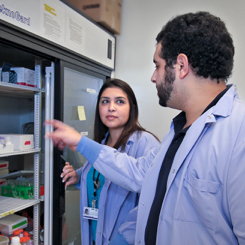Training & Curriculum
The curriculum of the PhD in Biomedical Sciences emphasizes research training and closely mentored instruction within a human disease-focused framework. The program prepares students for successful careers by training them as well-rounded scientists with a strong foundation of knowledge in research design, methodology, presentation and the skills needed to compete for research funding.
Program Goals
One of the PhD program's primary goals is to provide a contextual understanding of how basic and preclinical research relate to treatment and pathophysiology of disease. Courses are taught in small tutorial groups by members of the world-class PhD and MD faculty of Cedars-Sinai.
Throughout the program, students have access to both basic science and clinical research mentors. Students are taught both by clinicians who diagnose and treat the diseases and by scientists who study their underlying mechanisms. Units will integrate biochemistry, immunology, genetics and microbiology, underscoring their interrelationships in understanding the mechanisms of human disease. Students will achieve:
- Broad knowledge and understanding of the biological sciences and their relevance to medicine
- Creativity in and enthusiasm for scientific ideas
- The ability to think "scientifically" and to negotiate scientific problem-solving
- The ability to acquire the necessary knowledge that is not included in the core curriculum but that is relevant to research projects
- The ability to conduct a scientific argument verbally and/or in writing with mentor, teachers and peers
- Initiative in engaging mentors, teachers and peers in creating supportive networks to enhance scientific growth
- Productive interactions with clinicians working on medical problems relevant to the primary research interest of the student to facilitate translational opportunities
Courses and Lab Rotation
Year 1
First-year students will be introduced to mentors and laboratories and will select up to three laboratories through which to rotate. Students will spend time in these laboratories familiarizing themselves with the research and the researchers. At the end of the laboratory rotations, the students will select their dissertation mentors for their primary research leading to the doctoral degree.
During the first year, all students will complete the core curriculum and participate in ongoing workshops, seminars and research-in-progress talks as well as complete three trimesters of didactic courses focusing on translational research components, research ethics, scientific writing, cell research and disease systems.
The goal of the core curriculum is to:
- Acquire skillsets for designing, testing, presenting, and critically reviewing rigorously planned biomedical research;
- Provide an overview of the research areas, skills, knowledge base, and stakeholders involved in the translational sciences trajectory; and
- Apply skills learned from 1 and 2 toward understanding and studying the intrinsic and extrinsic factors contributing to healthy and diseased cells and multicellular systems, through the lens of the Discovery, Development, and Delivery arms of the translational continuum.
Trimester 1: Fundamentals of Translational Research
The first trimester presents the essential skills in research including the forming of hypotheses and aims, reading and presenting a research paper, introducing rigor and reproducibility in research as well as bioethics in translational research. Each student will also be introduced to the technologies, mechanisms and methods of translational discovery, the preclinical methods and standard operating procedures of translational development and the regulatory and clinical trials considerations in translational delivery.
Trimester 2: 3D’s in Cell Intrinsic and Extrinsic Research
The second trimester concentrates on applying Discovery, Development, and Delivery skillsets toward cell intrinsic and extrinsic research including gene expression and regulation, protein translation and degradation, membrane dynamics and intracellular trafficking and intracellular signaling. Cell to cell interactions and cell-microenvironment interactions are also covered.
Trimester 3: 3D’s in Organ and Multicellular systems
Students will address organ and multicellular systems in the third and final trimester of the core curriculum through the lens of the Discovery, Development, and Delivery arms of the translational continuum. The immune system, neurobiology, cardiovascular, gastrointestinal systems will be explored within their context to health and human disease along with researching lung development and disease and cancer and aging.
Year 2
During the second year, students must complete a bioethics course, successfully complete a qualifying examination and participate in ongoing workshops and seminars. In addition, students must attend weekly research-in-progress meetings, which are required through to their fourth year.
After successfully passing the qualifying examination, students are advanced to PhD candidacy. At this time, students select a doctoral committee and prepare a proposal for their dissertation research.
Year 3
In their third year (and on), students complete thesis research and write and defend their dissertation. Students meet regularly with their doctoral committees and participate in ongoing workshops, seminars and research-in-progress meetings.
Students may also select a translational research mentor who supplements and adds value to the student's research while building on the translational and clinical element of the student's dissertation. Students are required to include a chapter on the translational relevance of their research in their final dissertation.
During this time, students also participate in an annual Graduate Student Symposium where graduate students present research talks and poster presentations. Graduate students from other institutions are invited to participate to share research and ideas as well as network.

Laboratory Rotations
Students are required to complete up to three laboratory rotations during the first year of the program. Laboratory rotations give graduate students an opportunity to experience different laboratory environments, research opportunities and investigators that they may be considering for their thesis research. These rotations also allow the faculty to get to know the students and evaluate them in a research setting. Laboratory rotations run congruent with the academic trimesters.
Students are expected to partake fully in the laboratories' activities, including group laboratory meetings, discussion groups and laboratory projects. Students are expected to arrange independently each of their rotations with the Cedars-Sinai mentoring faculty who are participating in the program.
Have Questions or Need Help?
If you have questions or wish to learn more about the PhD program, call us or send a message.
Graduate School of Biomedical Sciences
8687 Melrose Ave.
Suite G-532
West Hollywood, CA 90069